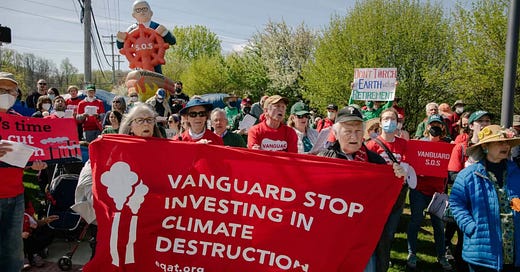My 401k Flipped From Climate Hero to One of the Worst Villains
Vanguard warns investors about risks from climate change, but decided it was OK with making the crisis worse
Maybe I should have paid closer attention. But while I was busy with other things (like the pandemic), Vanguard Investments, where I had a chunk of my retirement savings, backed out of its commitment to reduce its net climate emissions to zero by 2050. And it gets worse. Vanguard is now the number one investor in fossil fuels, investing a staggering $444 billion in coal, oil, and gas, according to the activist group Stop the Money Pipeline, which is leading a campaign to divest from Vanguard along with Earth Quaker Action Team.
Here’s the letter I sent to inform CEO Salim Ramji of my decision to withdraw my savings from this fund.
You, too, might be funding Vanguard or another one of the companies that are destroying prospects for life on Planet Earth. You can find out what your savings are being used for quickly and for free at Fossil Free Funds.
Dear Salim Ramji,
I am writing to inform you that I have made the difficult decision to transfer my retirement funds from Vanguard to alternative investment options that better align with my values. This decision was not made lightly as I have been a Vanguard client via my workplace 401(k) for many years. I had carefully selected my investment choices based on environmental and social criteria, so I was disappointed to learn you had dropped your climate commitments and are now considered one of the nation’s worst investors in climate polluting industries.
Primary Concerns
Withdrawal from Climate Commitments: I am deeply concerned about Vanguard's decision in December 2022 to withdraw from the Net Zero Asset Managers Initiative (NZAM), effectively abandoning your commitment to net-zero emissions by 2050. This withdrawal came after only 21 months of participation and appears to prioritize political pressure over scientific consensus and fiduciary responsibility to long-term investors.
Fossil Fuel Investment Leadership: According to recent analysis by environmental research organization Urgewald, Vanguard has now become the world's largest investor in fossil fuels. The tens of billion you have invested in ExxonMobil is particularly troubling given the company's documented history of climate science denial and lobbying against climate action.
Inconsistent Climate Risk Messaging: Vanguard's website acknowledges that "Climate change, and the ongoing global response, will have far-reaching economic consequences for companies, financial markets, and investors, presenting a clear example of a material and multifaceted financial risk." Your investment practices contradict this stated understanding. This disconnect between research and action undermines confidence in your commitment to protecting investors' long-term interests.
Why This Matters for All Investors
Financial Risk: Climate change poses systemic risks to the global economy. The UN has warned that greenhouse gas emissions must be cut in half by 2030 to avoid catastrophic warming. Continuing to heavily invest in fossil fuel companies that are incompatible with this timeline represents a significant financial risk to retirement portfolios.
Intergenerational Impact: Investing in industries that actively undermine the planet's life support systems is fundamentally incompatible with building wealth for future generations. The climate crisis will disproportionately affect younger people who are also relying on their retirement investments for long-term financial security.
Fiduciary Responsibility: As asset managers, you have a duty to consider material risks to long-term returns. Climate change represents one of the most significant systemic risks to the global economy, yet your current investment approach appears to ignore or downplay these risks.
Moving Forward
I have transferred my funds to investment options that maintain strong ESG screening, particularly around fossil fuel exclusions, while delivering competitive returns. These alternatives demonstrate that it is entirely possible to build wealth responsibly without compromising the planetary systems that support human civilization.
I hope Vanguard will reconsider its current approach and recognize that true long-term investing must account for the environmental and social factors that will shape the economy of the future. The transition to clean energy is not just an environmental imperative—it's an economic reality that forward-thinking investors are already embracing.
Investing in our future should mean investing in solutions that protect and enhance the world we're leaving to future generations, not undermining the very systems that make life and prosperity possible.
I look forward to hearing your response. I remain hopeful that Vanguard will realign its practices with its stated understanding of climate risks and return to leadership in sustainable investing. If you reconsider these ill-advised policies, please let me know and I will consider reinvesting in Vanguard.
Respectfully,
Sarah van Gelder




Glad you're highlighting this. It's hard to keep track of who the "good guys" and "bad guys" are.